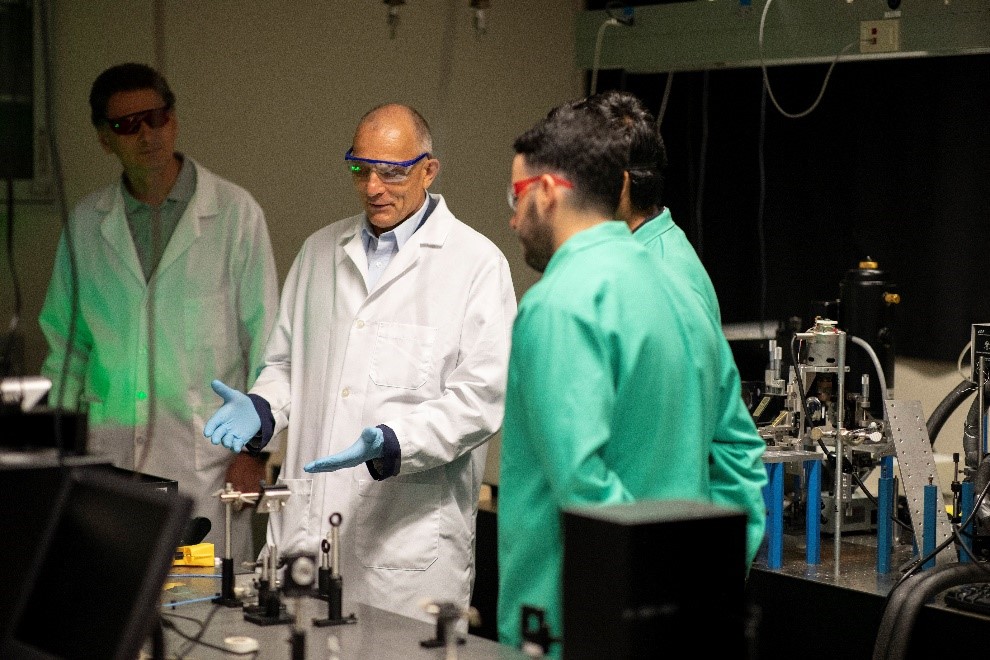Alzheimer’s Disease Research Drives Entrepreneurship in the Capital Region

Researchers at the Stack Family Center for Biopharmaceutical Education and Training produce small quantities of alpha-synuclein, a neurodegenerative protein associated with Alzheimer’s disease pathology.
As Rensselaer Polytechnic Institute launches an initiative to create more Alzheimer’s disease-related startups, the Capital Region is already the state’s third top recipient of National Institutes of Health (NIH) funding for private sector, for-profit research and development in this field.
Between fiscal years 2019 and 2023, Capital Region firms received $8.6 million in NIH awards (and one National Science Foundation award) for Alzheimer’s disease-related research*. That was the third largest sum among New York’s 10 economic development regions, trailing only the Hudson Valley ($22.2 million) and New York City ($28.8 million). In addition to these domestic for-profit awards, Capital Region schools, institutions and other nonprofits received $31,350,657 in funding for Alzheimer’s disease-related research – the sixth most in the state. Most Alzheimer’s disease research grants were awarded by the National Institute on Aging (NIA).

In the eight-county Capital Region, the firms that received NIH Alzheimer’s-related research grants include:
- Curia Global, Albany: A contract development and manufacturing organization (CDMO) that conducted exploratory chemistry research relating to Alzheimer’s disease.
- iPACES, Round Lake: Developer of a neuro-exergame with pedal-and-play features designed to preserve brain health and prevent or remediate cognitive decline.
- sxRNA Technologies: Developer of a high-throughput, 3D modeling screening tool for drug candidates for Alzheimer’s disease and Alzheimer’s disease-related dementias.
- Early Alzheimer’s Diagnostics, Albany: Developer of a Raman spectroscopy-based salvia screening test for early and preclinical Alzheimer’s disease. Early Alzheimer’s Diagnostics was also the only firm in the state during the five-year period to receive an NSF grant for Alzheimer’s disease-related research.
- Kitware, Clifton Park: A software development firm that conducted research on an enhanced software tool for detecting anatomical differences in image data sets.
 Scott Tennebaum is the founder of the UAlbany spinoff company sxRNA Technologies.
Scott Tennebaum is the founder of the UAlbany spinoff company sxRNA Technologies.
To further drive Alzheimer’s disease-related research and entrepreneurship, RPI received from the NIA a five-year $1,257,725 grant for the new Rensselaer Alzheimer’s Fellows to Accelerate Entrepreneurship in Life Sciences (RAFAELs) program. Under this program, RPI graduate students who are researching Alzheimer’s disease will participate in a summer bootcamp that will train them on commercializing their innovations with help from artificial intelligence and data science. The program will also include a course on evolving startups to financial stability and establish a mandatory industry internship for fellows. This funding came on top of another five-year $1,203,935 grant that supports the Alzheimer’s disease research for post-doctoral students, who also receive clinical and translational exposure through a subcontract with the Icahn School of Medicine at Mount Sinai.
The University at Albany also recently partnered with the Leibniz Institute of Photonic Technology in Germany to create the Center for Biophotonic Technology and Artificial Intelligence. The center will be focused on research for Raman spectroscopy, which drives the Alzheimer’s disease detection technology developed by Early Alzheimer’s Diagnostics as well as a method for the rapid characterization of wood-based materials developed by the UAlbany startup Sangali. The new center may help create new startups.

UAlbany Professor Igor Lednev is the founder of Early Alzheimer’s Diagnostics
Additionally, PharmD students from the Albany College of Pharmacy and Health Sciences and contract research scientists at the Stack Family Center for Biopharmaceutical Education and Training (CBET) are producing small quantities of alpha-synuclein, a neurodegenerative protein associated with Alzheimer’s disease pathology of a protein associated with Alzheimer’s disease pathology. Under the leadership of the CBET’s executive director, Michelle Lewis, the center in late 2022 started producing this high-purity material that supports both in-vitro and in-vivo studies for the exploration of disease progression and new treatment option.
Note
“Alzheimer’s Disease-related research” includes NIH grants awarded between fiscal years 2019 and 2023 and with “Alzheimer’s” as one of its project terms in the NIH RePORTER database.
CEG INITIATIVES
As a New York State MEP center, CEG’s Manufacturing Solutions also helps Capital Region manufacturers increase their productivity by providing a menu of technical support services, such as Lean Enterprise Training, ISO Certification Assistance, Technology-Driven Market Intelligence, and CoreValue benchmarking assessments.
In 2023, CEG Manufacturing Solutions had the following impacts on Capital Region manufacturers:
- $17 million in new and retained sales
- 115 jobs created and retained
- $10 million in new investments
- $600,000 in cost savings
CEG also drives the Manufacturing Solutions Network, a network brings together Capital Region manufacturers to learn from experts on industry relevant topics, participate in thematic roundtables, discuss common issues, and expand their network.
Don’t miss these insights into the trends that are shaping the Capital Region’s economy. Sign up for CEG’s e-news and follow us on:













